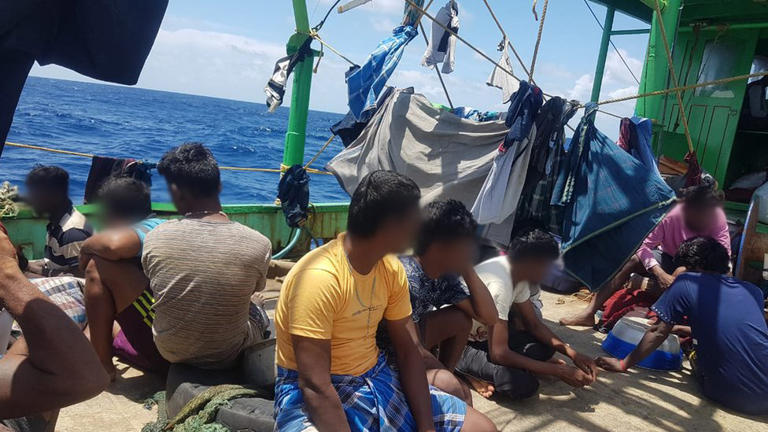 A group of Sri Lankan asylum seekers on an isolated British island territory have told UN investigators they feel unsafe and forgotten, as they reported sexual assaults and harassment of children, as well as self-harm and suicide attempts.
A group of Sri Lankan asylum seekers on an isolated British island territory have told UN investigators they feel unsafe and forgotten, as they reported sexual assaults and harassment of children, as well as self-harm and suicide attempts.
Inspectors from the UN’s refugee agency visited Diego Garcia, in the Indian Ocean, to check on their welfare.
They found that conditions there amounted to arbitrary detention.
The Foreign Office said the island was not suitable for migrants to live.
Other than the migrant camp, the island is used as a UK-US military base. Thousands of troops are stationed there, usually on a one-year deployment, along with a smaller number of military contractors. For all allegations of sexual assault and harassment, the alleged perpetrators were other asylum seekers.
Civilian visitors are not allowed – and the island has officially had no resident population since the early 1970s when UK relocated all the people living there so it could develop the base.
The 61 people currently in the island camp are mostly Sri Lankan Tamils and the first of them landed on Diego Garcia in October 2021 after their boat ran into trouble while trying to sail to Canada, according to migrants and officials.
heir subsequent asylum claims were the first ever to be launched on British Indian Ocean Territory (BIOT) – an area described as being “constitutionally distinct and separate from the UK”, and where the UK government argues that the refugee convention does not apply.
In its response to the UN report on the asylum seekers, a Foreign Office spokeswoman said: “”BIOT is not a suitable location for migrants, which is why we have been working tirelessly to process the migrants’ claims for protection and to find a suitable third country for those whose claims are upheld.
“At all times, the welfare and safety of migrants on BIOT has been our top priority.”
UNHCR – the UN Refugee Agency – says the visit by its inspectors in late November marked the first time an “external party” had gained access to the island to monitor conditions there since the asylum seekers’ arrival. The draft report it produced following its visit was released to the BBC by the supreme court of BIOT.
During its visit, UNHCR representatives heard several allegations of sexual assault and harassment, with alleged victims including young children. In all instances, the alleged perpetrators were other asylum seekers, the report says.
It adds that there was likely to be an “under-reporting” of sexual violence because of shame and stigma, and a view among asylum seekers that there would not be an effective response.
“It was clear from speaking to asylum seekers, both the general population and those who had made allegations, that they did not see anything to be gained by reporting, both in terms of justice and safety, including due to the fact that alleged perpetrators of sexual assault remain living in the camp alongside alleged victims,” the report says.
A decision made last July to designate family tents and single male tents was a “positive step” but “unlikely to be sufficient as a prevention mechanism”, it notes, adding that there was “little evidence of other preventive measures”.
In the UN report, the asylum seekers on the island, which is hundreds of miles away from any other population, describe being bitten by rats in a fenced-off camp and say that they are only permitted to leave it under security escort, even if they just want to walk to the beach.
That has led to feelings of despair and and incidents of self-harm and suicide attempts, , the UN’s draft report – one of the first detailed insights into conditions on the island – says.
The group of asylum seekers, which includes 16 children, said they felt bored, depressed, and hopeless. Some said they felt “forgotten”, while one woman said: “Many of us think about ending our lives.”
Some of the children told the inspectors they had witnessed violence and self-harm, and made multiple references to suicide during the UN visit, the draft report says.
Some of them recalled a time when a security dog came to visit the camp and they watched it through the security fence. “The children said that it made them sad that the dog was able to be outside the fence and they were not,” the report says.
The asylum seekers do not have access to the internet and have never met their lawyers in person. Until now, details of the conditions they are being held in have been scarce – recounted mainly in court hearings in the UK.
A separate process has been established to determine if the group should be sent back to Sri Lanka or to a “safe third country”.
The BBC last year established contact with multiple asylum seekers on the island, who described conditions there as hellish.


Post a Comment